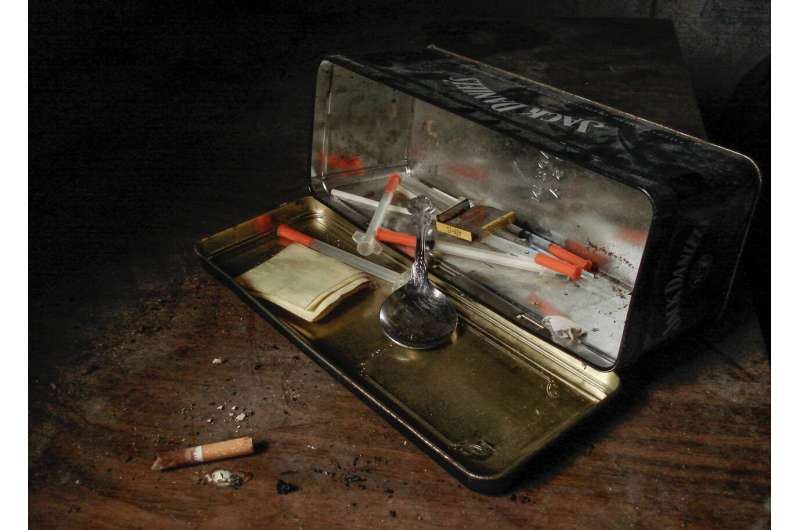Credit: Unsplash/CC0 Public Domain
Top-down approaches to tackling substance abuse in drug-ravaged parts of Colombia, Afghanistan and Myanmar are harming livelihoods, health and ecology, a new study warns.
Cocaine, opiates and meth are widespread among the poor and young in some communities because of the role drugs play in their local economies, and because they are taken by workers to cope with physically punishing jobs.
Drug wars are not the solution in these regions, the research says. Instead, helping people build new economies would transform their lives.
The research, published in the journal Third World Quarterly, was carried out by Dr. Maziyar Ghiabi from the University of Exeter, who set out to explore the impact of "narco-capitalism"—what life is like at the nexus of drug production, trade and consumption.
Dr. Ghiabi and the international team of researchers carried out 60 in-depth interviews with people living in the drug producing territories of Colombia, Afghanistan and Myanmar, the combined region responsible for much of the world's opium, heroin and cocaine production.
The team engaged with coca grower communities (cocaleros) in Putumayo (Colombia); communities involved in poppy cultivation, opiate and meth consumption in the Kachin and Shan states (Myanmar); and poppy growers, opiate traders and local communities in Nimroz and Nangahar (Afghanistan) between 2018 and 2020. This included peasants, community leaders, local and trans-border traders, drug consumers, police officers, and current and former militia members.
In Afghanistan there have been unprecedented levels of poppy cultivation, and the study warns a drug economy in the country will remain because of the U.S. withdrawal from Afghanistan.
In Myanmar, the PA-O ceasefire agreement in 2015 coincided with the arrival of drugs and the increasingly public visibility of "addiction" to substances other than opium.
In Kachin state, an elderly peasant said peace hadn't led to fewer drugs: "Since the ceasefire period, the Chinese came in, people could move around more easily, and drugs started flooding in. Yes, the ceasefire was a good thing but since the ceasefire, drugs became more available. I see it that way."
A villager and local representative in southern Shan state, a region bordering China, Thailand and Laos, said there were "a few poppy plantations in some of the villages around Taunggyi, in Pinlaung and Hsihseng," but following the ceasefire these territories came under the militias' control, and "poppy plantations and drugs were allowed without any restrictions." He stated that because of taxes on the local farmers for their crops and land, people grow poppies since they can earn more money more quickly compared to other regular crops. Since then, heroin and meth have become widely available.
Dr. Ghiabi writes, "Traders and petty dealers face the militarized onslaught of governments and rival organizations in the drug wars and/or the war on insurgency. People deprived of social bonds and community become the target of the greed of the pharmaceutical industry or of predatory dealing practices in its promotion of opioids and other habit-forming substances."
In Danai in Western Kachin State, a miner described how many miners use drugs to boost their energy. He said he had witnessed many cohorts "becoming addicts" or "perishing because of drugs." Opium is "hard to get" but heroin and meth are "found easily" as they perform more effectively in these labor conditions.
One of the miners in Shan State confirmed that the owner of the mining business gave "yaa baa" pills to the stone workers, who have the heavier toll in the mine. The drug, the owner claimed, make[s] them stronger and healthier.
"Sometimes they cannot even hire workers if they cannot provide them with drugs," claims a miner, who adds that once "...addicted, the workers buy the drugs with all the money they make each day."
The study also outlines different responses to drug use. In Colombia local communities have stepped up social organization and territorial reclaiming as a first step towards a different everyday life. Conversely, in Myanmar, popular and militia organizations have started moral campaigns against drugs, which include severe, often inhumane punishments against people who use drugs or suffer from addiction. Ultimately, Dr. Ghiabi suggests in order to understand the violence produced by illicit drug economies, we may need to look at the socio-economic forms of life where they take place rather than at drugs themselves.
The research is part of a Special Issue on The Everyday Life of Drugs published by Third World Quarterly guest edited by Dr. Maziyar Ghiabi. On January 27 it will be launched as part of the 2-day Symposium on "Healing Disruption: Other Histories of Intoxication and Recovery," which takes place at the University of Exeter.
More information: Maziyar Ghiabi, Critique of everyday narco-capitalism, Third World Quarterly (2022). DOI: 10.1080/01436597.2022.2053776
Provided by University of Exeter




















